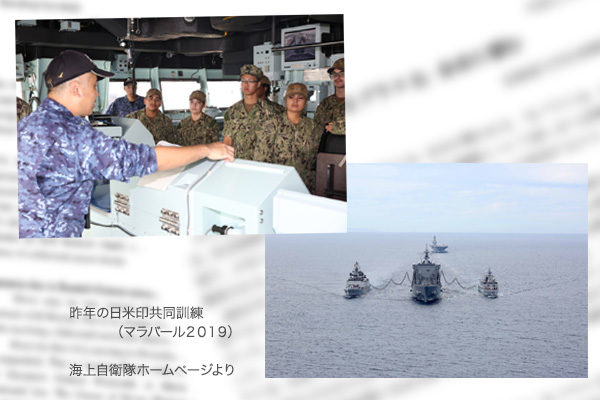In a landmark decision, India has invited the Australian Navy to join the Malabar naval exercises 2020. India’s invitation comes on the heels of the Tokyo meeting of the foreign ministers of the Quadrilateral (Quad) grouping comprising of India, the US, Japan and Australia. India and the US established the Malabar naval exercises in 1992. Japan became a regular member in 2015. It is likely that Australia may also join the Malabar exercises formally in due course.
An Indian government's press release placed the Australian participation in the Malabar 2020 in the context of “engaging to enhance safety and security in the maritime domain” and “free, open and inclusive Indo-Pacific… rules-based international order”. Australian Defence Minister saw the Malabar exercises as a demonstration of “ our collective resolve to support an open and prosperous Indo-Pacific.” and the “deep trust between four major Indo-Pacific democracies and their shared will to work together on common security interests…”
India’s major shift towards security cooperation
Australia had been keen to rejoin the Malabar exercises for some time now. However, India was reluctant to let Australia in, given its decision to walk out of the Quad in 2007 under the Chinese pressure. That put an end to the first edition of the Quad. The grouping was revived in 2017 at the level of officials and upgraded to the Foreign Ministers’ level in 2019.
By inviting Australia, India has signalled a major shift in its hitherto cautious position on security cooperation in the Quad framework. This is on account of the military clashes between India and China on the Line of Actual Control in Ladakh in the North in which it lost twenty soldiers. China’s growing intransigence in the East China Sea and the South China Sea, Hongkong and Taiwan has also created tensions in the Indo-Pacific and contributed to the consolidation of both the Quad as well as the Malabar exercises.
The Malabar exercises predate the first Quad that was set up in 2004 in the wake of the Indian Ocean tsunami. It was an impromptu mechanism of the navies of the US, Australia, Japan and India to coordinate humanitarian disaster relief before it took a politico-military complexion. Thus, the naval cooperation is in the DNA of the Quad. The growing link between Malabar exercises and quad, though not acknowledged explicitly, cannot be missed.
Geopolitical significance of Australia’s participation
The geopolitical significance of including Australia in the Malabar 2020 naval exercises cannot be overstated. First, India is now relatively more open than before to hard security cooperation with the Quad members countries. It has already signed important military logistics and information exchange agreements with the Quad member countries. It is also conducting bilateral military exercises with them. Second, China which originally saw the Quad is mere ‘foam’ in the sea is now seeing in it the beginning of the formation of ‘Asian NATO’. China’s fear may be exaggerated but it is certainly concerned. Third, the Malabar exercises are linked with the security and stability in the Indo Pacific region. Fourth, the inclusion of Australia in the Malabar exercises would make the security dimension of the Quad more overt.
As China’s behaviour becomes more assertive, the Quad may get more institutionalised in the future. The possibilities of a defence minister level meeting and eventually a Quad leaders’ summit, a Quad charter and even a secretariat are likely. But that is still some time in the future. The outcome of the US elections and the foreign policy and security stances of the new administration will also have a bearing on the evolution of the Quad.
Arvind Gupta is Director, the Vivekananda International Foundation, New Delhi.


